Tesco: Analysing Organisational Behaviour, Culture, Power & Motivation
VerifiedAdded on 2023/06/18
|13
|5054
|302
Report
AI Summary
This report provides an analysis of organisational behaviour within Tesco Plc, focusing on how culture, politics, and power influence individual and team behaviour and performance. It examines Handy's model of culture (Role, Power, Person, and Task) and different forms of organisational power (Formal, Referent, Coercive, and Reward). The report also evaluates content and process theories of motivation, including Herzberg's two-factor theory and Maslow's hierarchy of needs, to understand how motivational techniques can enable effective achievement of organisational goals. Furthermore, the report distinguishes between effective and ineffective teams and applies organisational behaviour concepts to specific business situations within Tesco. The analysis concludes with recommendations for improving organisational culture and employee motivation.
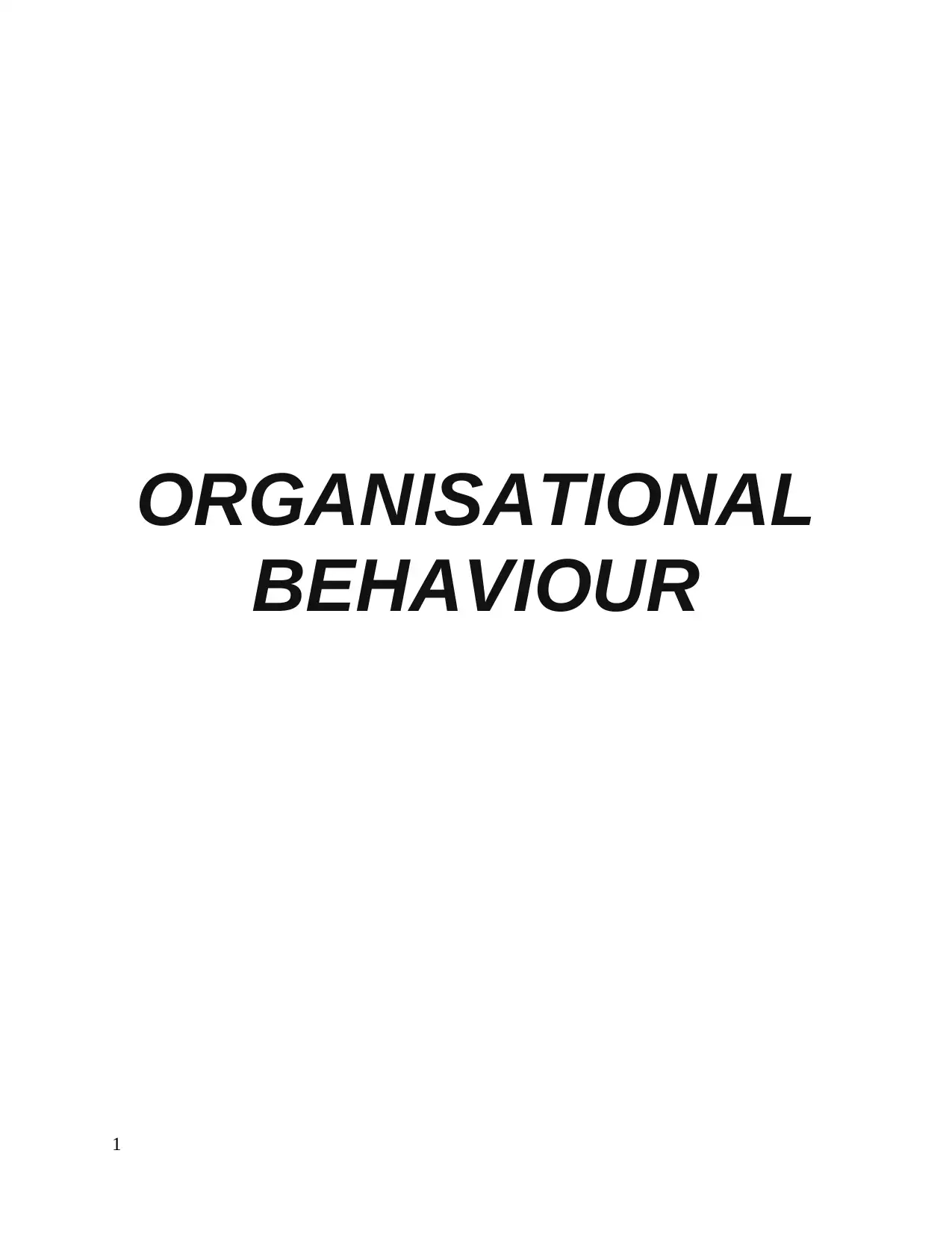
ORGANISATIONAL
BEHAVIOUR
1
BEHAVIOUR
1
Paraphrase This Document
Need a fresh take? Get an instant paraphrase of this document with our AI Paraphraser
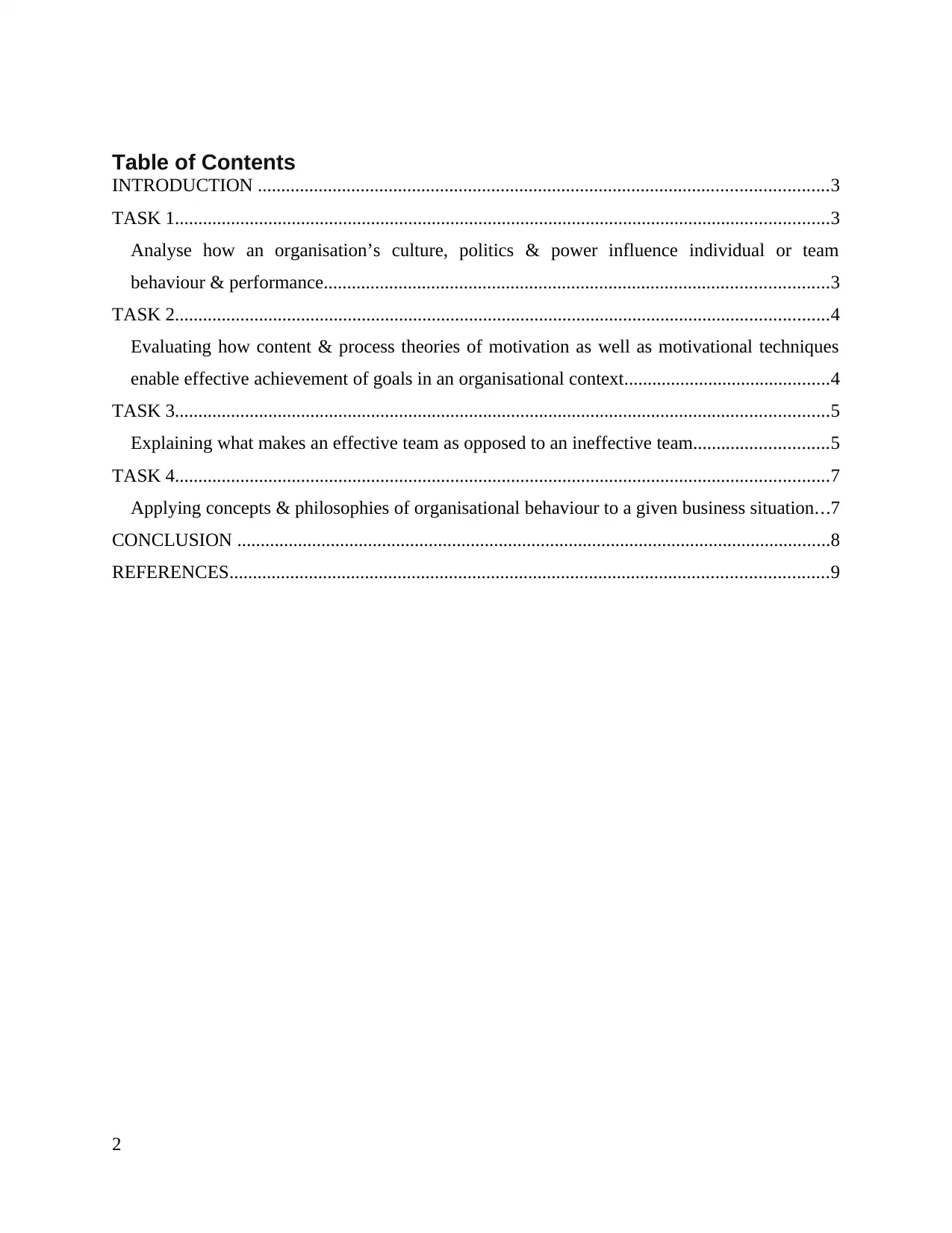
Table of Contents
INTRODUCTION ..........................................................................................................................3
TASK 1............................................................................................................................................3
Analyse how an organisation’s culture, politics & power influence individual or team
behaviour & performance............................................................................................................3
TASK 2............................................................................................................................................4
Evaluating how content & process theories of motivation as well as motivational techniques
enable effective achievement of goals in an organisational context............................................4
TASK 3............................................................................................................................................5
Explaining what makes an effective team as opposed to an ineffective team.............................5
TASK 4............................................................................................................................................7
Applying concepts & philosophies of organisational behaviour to a given business situation...7
CONCLUSION ...............................................................................................................................8
REFERENCES................................................................................................................................9
2
INTRODUCTION ..........................................................................................................................3
TASK 1............................................................................................................................................3
Analyse how an organisation’s culture, politics & power influence individual or team
behaviour & performance............................................................................................................3
TASK 2............................................................................................................................................4
Evaluating how content & process theories of motivation as well as motivational techniques
enable effective achievement of goals in an organisational context............................................4
TASK 3............................................................................................................................................5
Explaining what makes an effective team as opposed to an ineffective team.............................5
TASK 4............................................................................................................................................7
Applying concepts & philosophies of organisational behaviour to a given business situation...7
CONCLUSION ...............................................................................................................................8
REFERENCES................................................................................................................................9
2
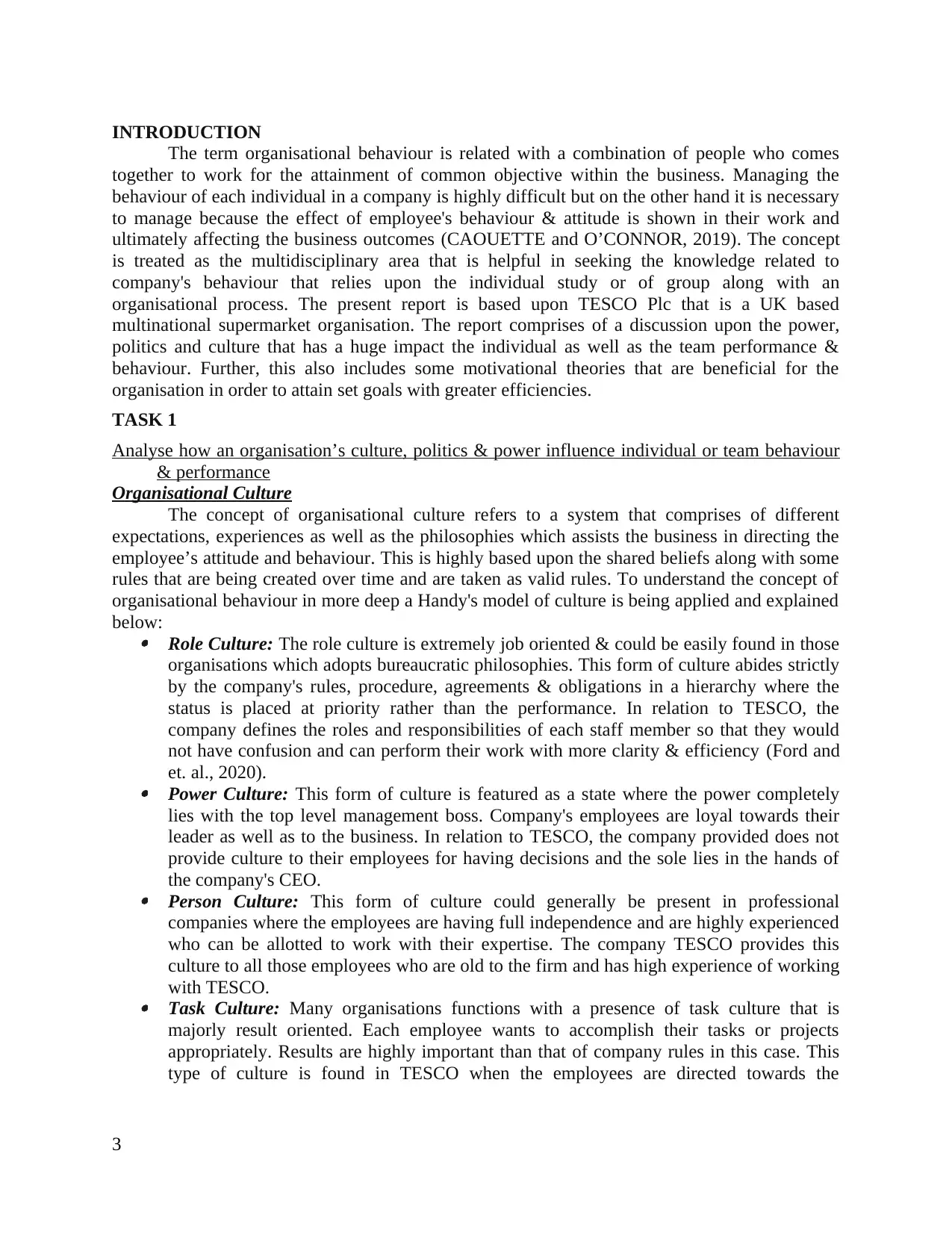
INTRODUCTION
The term organisational behaviour is related with a combination of people who comes
together to work for the attainment of common objective within the business. Managing the
behaviour of each individual in a company is highly difficult but on the other hand it is necessary
to manage because the effect of employee's behaviour & attitude is shown in their work and
ultimately affecting the business outcomes (CAOUETTE and O’CONNOR, 2019). The concept
is treated as the multidisciplinary area that is helpful in seeking the knowledge related to
company's behaviour that relies upon the individual study or of group along with an
organisational process. The present report is based upon TESCO Plc that is a UK based
multinational supermarket organisation. The report comprises of a discussion upon the power,
politics and culture that has a huge impact the individual as well as the team performance &
behaviour. Further, this also includes some motivational theories that are beneficial for the
organisation in order to attain set goals with greater efficiencies.
TASK 1
Analyse how an organisation’s culture, politics & power influence individual or team behaviour
& performance
Organisational Culture
The concept of organisational culture refers to a system that comprises of different
expectations, experiences as well as the philosophies which assists the business in directing the
employee’s attitude and behaviour. This is highly based upon the shared beliefs along with some
rules that are being created over time and are taken as valid rules. To understand the concept of
organisational behaviour in more deep a Handy's model of culture is being applied and explained
below:
Role Culture: The role culture is extremely job oriented & could be easily found in those
organisations which adopts bureaucratic philosophies. This form of culture abides strictly
by the company's rules, procedure, agreements & obligations in a hierarchy where the
status is placed at priority rather than the performance. In relation to TESCO, the
company defines the roles and responsibilities of each staff member so that they would
not have confusion and can perform their work with more clarity & efficiency (Ford and
et. al., 2020).
Power Culture: This form of culture is featured as a state where the power completely
lies with the top level management boss. Company's employees are loyal towards their
leader as well as to the business. In relation to TESCO, the company provided does not
provide culture to their employees for having decisions and the sole lies in the hands of
the company's CEO.
Person Culture: This form of culture could generally be present in professional
companies where the employees are having full independence and are highly experienced
who can be allotted to work with their expertise. The company TESCO provides this
culture to all those employees who are old to the firm and has high experience of working
with TESCO.
Task Culture: Many organisations functions with a presence of task culture that is
majorly result oriented. Each employee wants to accomplish their tasks or projects
appropriately. Results are highly important than that of company rules in this case. This
type of culture is found in TESCO when the employees are directed towards the
3
The term organisational behaviour is related with a combination of people who comes
together to work for the attainment of common objective within the business. Managing the
behaviour of each individual in a company is highly difficult but on the other hand it is necessary
to manage because the effect of employee's behaviour & attitude is shown in their work and
ultimately affecting the business outcomes (CAOUETTE and O’CONNOR, 2019). The concept
is treated as the multidisciplinary area that is helpful in seeking the knowledge related to
company's behaviour that relies upon the individual study or of group along with an
organisational process. The present report is based upon TESCO Plc that is a UK based
multinational supermarket organisation. The report comprises of a discussion upon the power,
politics and culture that has a huge impact the individual as well as the team performance &
behaviour. Further, this also includes some motivational theories that are beneficial for the
organisation in order to attain set goals with greater efficiencies.
TASK 1
Analyse how an organisation’s culture, politics & power influence individual or team behaviour
& performance
Organisational Culture
The concept of organisational culture refers to a system that comprises of different
expectations, experiences as well as the philosophies which assists the business in directing the
employee’s attitude and behaviour. This is highly based upon the shared beliefs along with some
rules that are being created over time and are taken as valid rules. To understand the concept of
organisational behaviour in more deep a Handy's model of culture is being applied and explained
below:
Role Culture: The role culture is extremely job oriented & could be easily found in those
organisations which adopts bureaucratic philosophies. This form of culture abides strictly
by the company's rules, procedure, agreements & obligations in a hierarchy where the
status is placed at priority rather than the performance. In relation to TESCO, the
company defines the roles and responsibilities of each staff member so that they would
not have confusion and can perform their work with more clarity & efficiency (Ford and
et. al., 2020).
Power Culture: This form of culture is featured as a state where the power completely
lies with the top level management boss. Company's employees are loyal towards their
leader as well as to the business. In relation to TESCO, the company provided does not
provide culture to their employees for having decisions and the sole lies in the hands of
the company's CEO.
Person Culture: This form of culture could generally be present in professional
companies where the employees are having full independence and are highly experienced
who can be allotted to work with their expertise. The company TESCO provides this
culture to all those employees who are old to the firm and has high experience of working
with TESCO.
Task Culture: Many organisations functions with a presence of task culture that is
majorly result oriented. Each employee wants to accomplish their tasks or projects
appropriately. Results are highly important than that of company rules in this case. This
type of culture is found in TESCO when the employees are directed towards the
3
⊘ This is a preview!⊘
Do you want full access?
Subscribe today to unlock all pages.

Trusted by 1+ million students worldwide
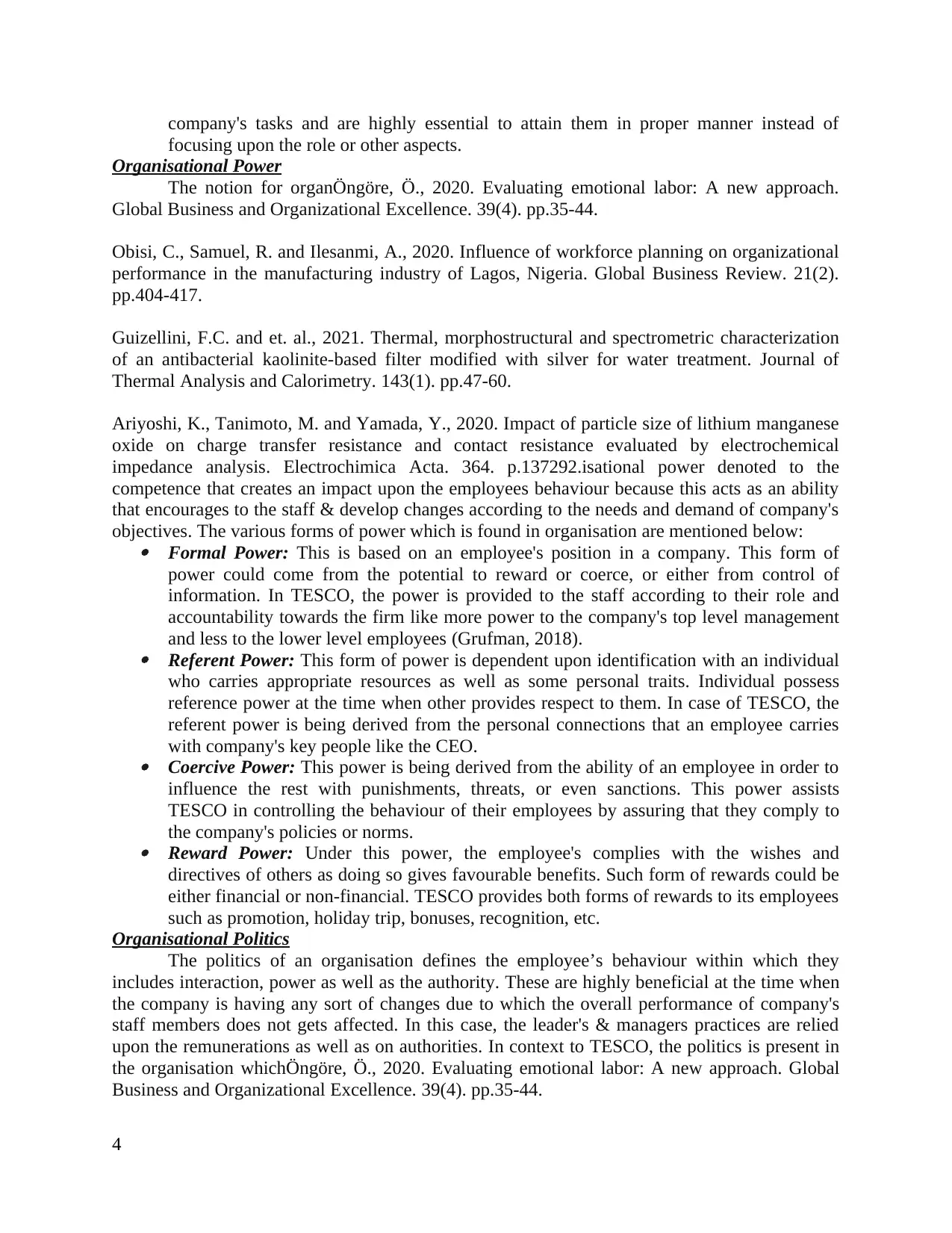
company's tasks and are highly essential to attain them in proper manner instead of
focusing upon the role or other aspects.
Organisational Power
The notion for organÖngöre, Ö., 2020. Evaluating emotional labor: A new approach.
Global Business and Organizational Excellence. 39(4). pp.35-44.
Obisi, C., Samuel, R. and Ilesanmi, A., 2020. Influence of workforce planning on organizational
performance in the manufacturing industry of Lagos, Nigeria. Global Business Review. 21(2).
pp.404-417.
Guizellini, F.C. and et. al., 2021. Thermal, morphostructural and spectrometric characterization
of an antibacterial kaolinite-based filter modified with silver for water treatment. Journal of
Thermal Analysis and Calorimetry. 143(1). pp.47-60.
Ariyoshi, K., Tanimoto, M. and Yamada, Y., 2020. Impact of particle size of lithium manganese
oxide on charge transfer resistance and contact resistance evaluated by electrochemical
impedance analysis. Electrochimica Acta. 364. p.137292.isational power denoted to the
competence that creates an impact upon the employees behaviour because this acts as an ability
that encourages to the staff & develop changes according to the needs and demand of company's
objectives. The various forms of power which is found in organisation are mentioned below:
Formal Power: This is based on an employee's position in a company. This form of
power could come from the potential to reward or coerce, or either from control of
information. In TESCO, the power is provided to the staff according to their role and
accountability towards the firm like more power to the company's top level management
and less to the lower level employees (Grufman, 2018).
Referent Power: This form of power is dependent upon identification with an individual
who carries appropriate resources as well as some personal traits. Individual possess
reference power at the time when other provides respect to them. In case of TESCO, the
referent power is being derived from the personal connections that an employee carries
with company's key people like the CEO.
Coercive Power: This power is being derived from the ability of an employee in order to
influence the rest with punishments, threats, or even sanctions. This power assists
TESCO in controlling the behaviour of their employees by assuring that they comply to
the company's policies or norms.
Reward Power: Under this power, the employee's complies with the wishes and
directives of others as doing so gives favourable benefits. Such form of rewards could be
either financial or non-financial. TESCO provides both forms of rewards to its employees
such as promotion, holiday trip, bonuses, recognition, etc.
Organisational Politics
The politics of an organisation defines the employee’s behaviour within which they
includes interaction, power as well as the authority. These are highly beneficial at the time when
the company is having any sort of changes due to which the overall performance of company's
staff members does not gets affected. In this case, the leader's & managers practices are relied
upon the remunerations as well as on authorities. In context to TESCO, the politics is present in
the organisation whichÖngöre, Ö., 2020. Evaluating emotional labor: A new approach. Global
Business and Organizational Excellence. 39(4). pp.35-44.
4
focusing upon the role or other aspects.
Organisational Power
The notion for organÖngöre, Ö., 2020. Evaluating emotional labor: A new approach.
Global Business and Organizational Excellence. 39(4). pp.35-44.
Obisi, C., Samuel, R. and Ilesanmi, A., 2020. Influence of workforce planning on organizational
performance in the manufacturing industry of Lagos, Nigeria. Global Business Review. 21(2).
pp.404-417.
Guizellini, F.C. and et. al., 2021. Thermal, morphostructural and spectrometric characterization
of an antibacterial kaolinite-based filter modified with silver for water treatment. Journal of
Thermal Analysis and Calorimetry. 143(1). pp.47-60.
Ariyoshi, K., Tanimoto, M. and Yamada, Y., 2020. Impact of particle size of lithium manganese
oxide on charge transfer resistance and contact resistance evaluated by electrochemical
impedance analysis. Electrochimica Acta. 364. p.137292.isational power denoted to the
competence that creates an impact upon the employees behaviour because this acts as an ability
that encourages to the staff & develop changes according to the needs and demand of company's
objectives. The various forms of power which is found in organisation are mentioned below:
Formal Power: This is based on an employee's position in a company. This form of
power could come from the potential to reward or coerce, or either from control of
information. In TESCO, the power is provided to the staff according to their role and
accountability towards the firm like more power to the company's top level management
and less to the lower level employees (Grufman, 2018).
Referent Power: This form of power is dependent upon identification with an individual
who carries appropriate resources as well as some personal traits. Individual possess
reference power at the time when other provides respect to them. In case of TESCO, the
referent power is being derived from the personal connections that an employee carries
with company's key people like the CEO.
Coercive Power: This power is being derived from the ability of an employee in order to
influence the rest with punishments, threats, or even sanctions. This power assists
TESCO in controlling the behaviour of their employees by assuring that they comply to
the company's policies or norms.
Reward Power: Under this power, the employee's complies with the wishes and
directives of others as doing so gives favourable benefits. Such form of rewards could be
either financial or non-financial. TESCO provides both forms of rewards to its employees
such as promotion, holiday trip, bonuses, recognition, etc.
Organisational Politics
The politics of an organisation defines the employee’s behaviour within which they
includes interaction, power as well as the authority. These are highly beneficial at the time when
the company is having any sort of changes due to which the overall performance of company's
staff members does not gets affected. In this case, the leader's & managers practices are relied
upon the remunerations as well as on authorities. In context to TESCO, the politics is present in
the organisation whichÖngöre, Ö., 2020. Evaluating emotional labor: A new approach. Global
Business and Organizational Excellence. 39(4). pp.35-44.
4
Paraphrase This Document
Need a fresh take? Get an instant paraphrase of this document with our AI Paraphraser
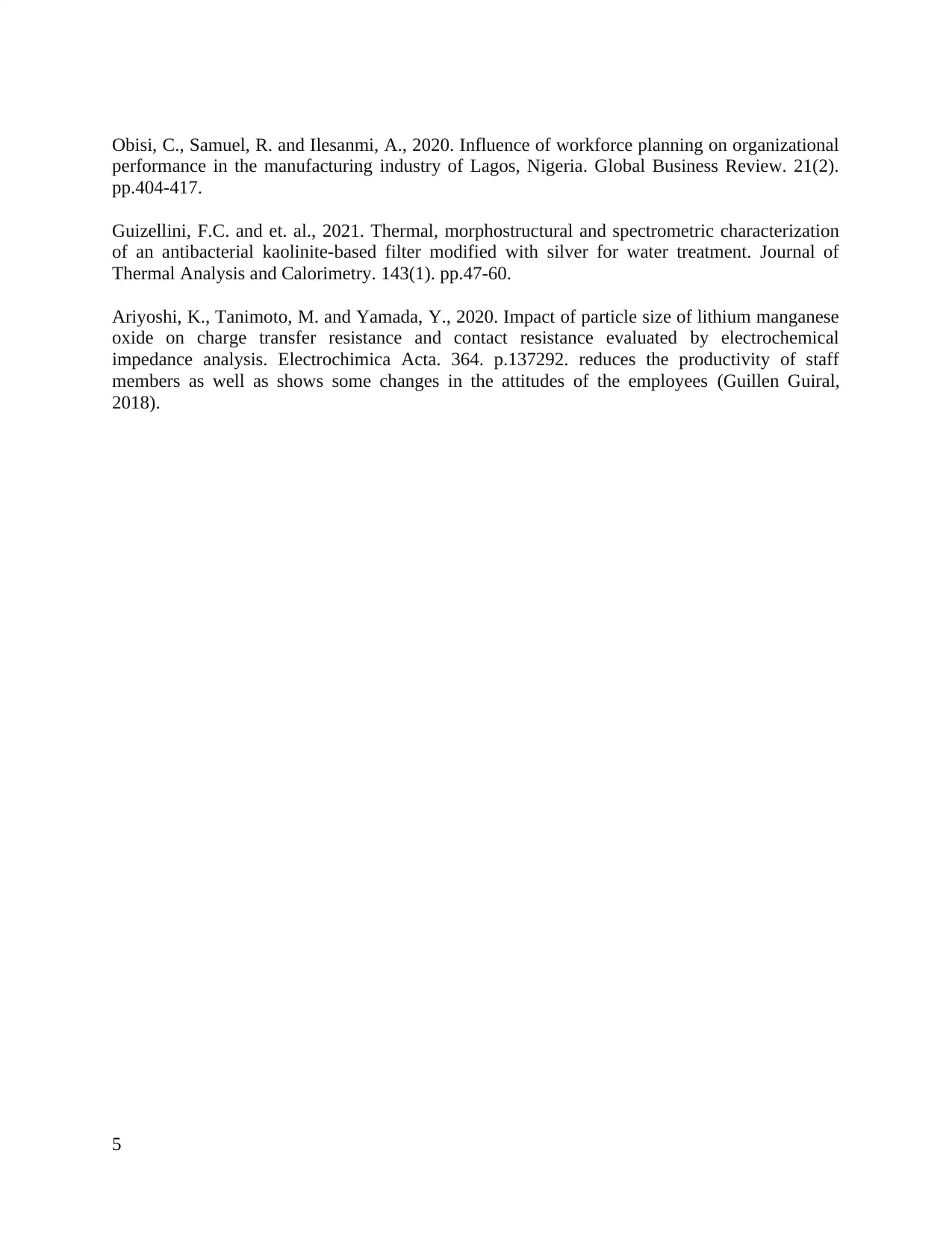
Obisi, C., Samuel, R. and Ilesanmi, A., 2020. Influence of workforce planning on organizational
performance in the manufacturing industry of Lagos, Nigeria. Global Business Review. 21(2).
pp.404-417.
Guizellini, F.C. and et. al., 2021. Thermal, morphostructural and spectrometric characterization
of an antibacterial kaolinite-based filter modified with silver for water treatment. Journal of
Thermal Analysis and Calorimetry. 143(1). pp.47-60.
Ariyoshi, K., Tanimoto, M. and Yamada, Y., 2020. Impact of particle size of lithium manganese
oxide on charge transfer resistance and contact resistance evaluated by electrochemical
impedance analysis. Electrochimica Acta. 364. p.137292. reduces the productivity of staff
members as well as shows some changes in the attitudes of the employees (Guillen Guiral,
2018).
5
performance in the manufacturing industry of Lagos, Nigeria. Global Business Review. 21(2).
pp.404-417.
Guizellini, F.C. and et. al., 2021. Thermal, morphostructural and spectrometric characterization
of an antibacterial kaolinite-based filter modified with silver for water treatment. Journal of
Thermal Analysis and Calorimetry. 143(1). pp.47-60.
Ariyoshi, K., Tanimoto, M. and Yamada, Y., 2020. Impact of particle size of lithium manganese
oxide on charge transfer resistance and contact resistance evaluated by electrochemical
impedance analysis. Electrochimica Acta. 364. p.137292. reduces the productivity of staff
members as well as shows some changes in the attitudes of the employees (Guillen Guiral,
2018).
5
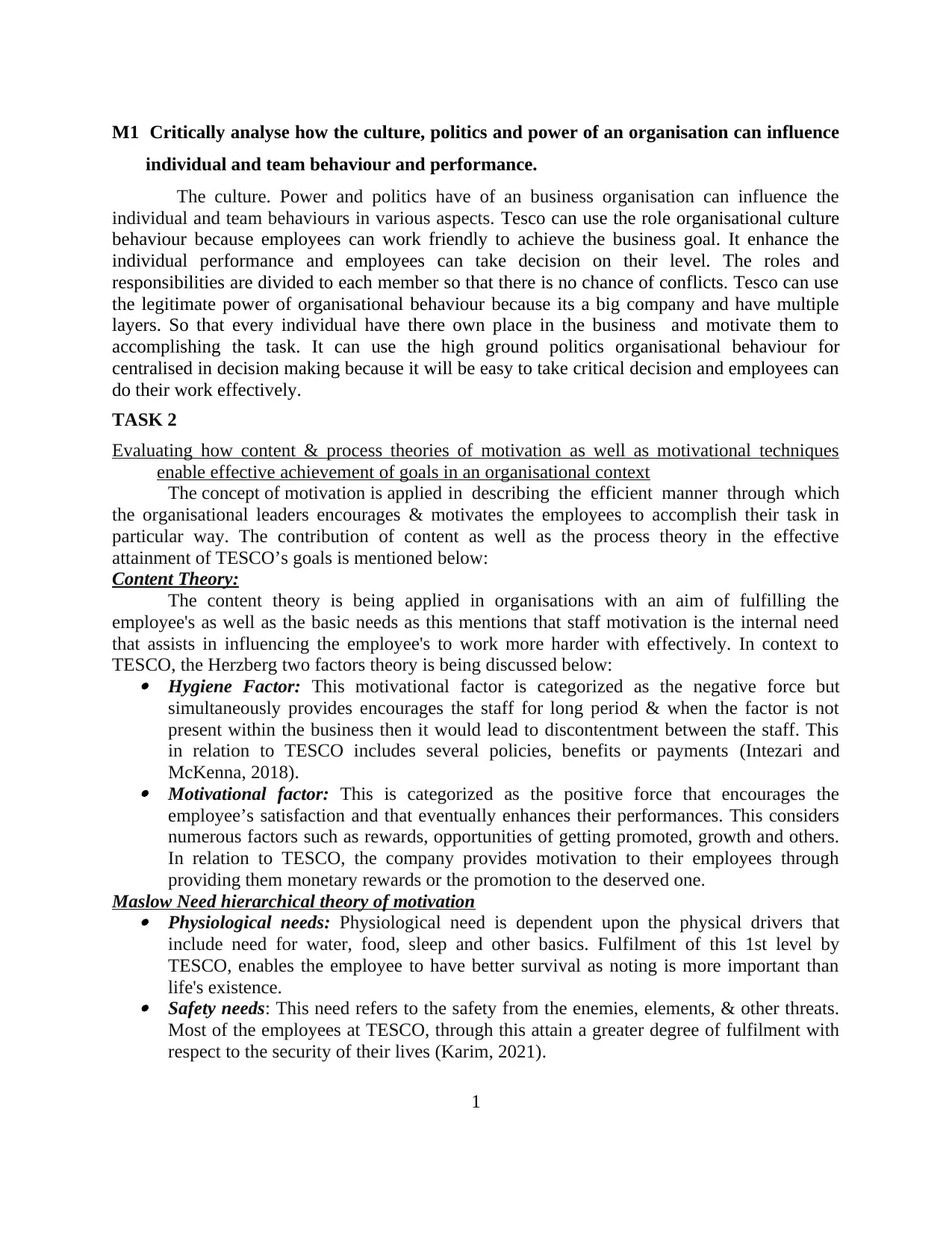
M1 Critically analyse how the culture, politics and power of an organisation can influence
individual and team behaviour and performance.
The culture. Power and politics have of an business organisation can influence the
individual and team behaviours in various aspects. Tesco can use the role organisational culture
behaviour because employees can work friendly to achieve the business goal. It enhance the
individual performance and employees can take decision on their level. The roles and
responsibilities are divided to each member so that there is no chance of conflicts. Tesco can use
the legitimate power of organisational behaviour because its a big company and have multiple
layers. So that every individual have there own place in the business and motivate them to
accomplishing the task. It can use the high ground politics organisational behaviour for
centralised in decision making because it will be easy to take critical decision and employees can
do their work effectively.
TASK 2
Evaluating how content & process theories of motivation as well as motivational techniques
enable effective achievement of goals in an organisational context
The concept of motivation is applied in describing the efficient manner through which
the organisational leaders encourages & motivates the employees to accomplish their task in
particular way. The contribution of content as well as the process theory in the effective
attainment of TESCO’s goals is mentioned below:
Content Theory:
The content theory is being applied in organisations with an aim of fulfilling the
employee's as well as the basic needs as this mentions that staff motivation is the internal need
that assists in influencing the employee's to work more harder with effectively. In context to
TESCO, the Herzberg two factors theory is being discussed below:
Hygiene Factor: This motivational factor is categorized as the negative force but
simultaneously provides encourages the staff for long period & when the factor is not
present within the business then it would lead to discontentment between the staff. This
in relation to TESCO includes several policies, benefits or payments (Intezari and
McKenna, 2018).
Motivational factor: This is categorized as the positive force that encourages the
employee’s satisfaction and that eventually enhances their performances. This considers
numerous factors such as rewards, opportunities of getting promoted, growth and others.
In relation to TESCO, the company provides motivation to their employees through
providing them monetary rewards or the promotion to the deserved one.
Maslow Need hierarchical theory of motivation
Physiological needs: Physiological need is dependent upon the physical drivers that
include need for water, food, sleep and other basics. Fulfilment of this 1st level by
TESCO, enables the employee to have better survival as noting is more important than
life's existence.
Safety needs: This need refers to the safety from the enemies, elements, & other threats.
Most of the employees at TESCO, through this attain a greater degree of fulfilment with
respect to the security of their lives (Karim, 2021).
1
individual and team behaviour and performance.
The culture. Power and politics have of an business organisation can influence the
individual and team behaviours in various aspects. Tesco can use the role organisational culture
behaviour because employees can work friendly to achieve the business goal. It enhance the
individual performance and employees can take decision on their level. The roles and
responsibilities are divided to each member so that there is no chance of conflicts. Tesco can use
the legitimate power of organisational behaviour because its a big company and have multiple
layers. So that every individual have there own place in the business and motivate them to
accomplishing the task. It can use the high ground politics organisational behaviour for
centralised in decision making because it will be easy to take critical decision and employees can
do their work effectively.
TASK 2
Evaluating how content & process theories of motivation as well as motivational techniques
enable effective achievement of goals in an organisational context
The concept of motivation is applied in describing the efficient manner through which
the organisational leaders encourages & motivates the employees to accomplish their task in
particular way. The contribution of content as well as the process theory in the effective
attainment of TESCO’s goals is mentioned below:
Content Theory:
The content theory is being applied in organisations with an aim of fulfilling the
employee's as well as the basic needs as this mentions that staff motivation is the internal need
that assists in influencing the employee's to work more harder with effectively. In context to
TESCO, the Herzberg two factors theory is being discussed below:
Hygiene Factor: This motivational factor is categorized as the negative force but
simultaneously provides encourages the staff for long period & when the factor is not
present within the business then it would lead to discontentment between the staff. This
in relation to TESCO includes several policies, benefits or payments (Intezari and
McKenna, 2018).
Motivational factor: This is categorized as the positive force that encourages the
employee’s satisfaction and that eventually enhances their performances. This considers
numerous factors such as rewards, opportunities of getting promoted, growth and others.
In relation to TESCO, the company provides motivation to their employees through
providing them monetary rewards or the promotion to the deserved one.
Maslow Need hierarchical theory of motivation
Physiological needs: Physiological need is dependent upon the physical drivers that
include need for water, food, sleep and other basics. Fulfilment of this 1st level by
TESCO, enables the employee to have better survival as noting is more important than
life's existence.
Safety needs: This need refers to the safety from the enemies, elements, & other threats.
Most of the employees at TESCO, through this attain a greater degree of fulfilment with
respect to the security of their lives (Karim, 2021).
1
⊘ This is a preview!⊘
Do you want full access?
Subscribe today to unlock all pages.

Trusted by 1+ million students worldwide
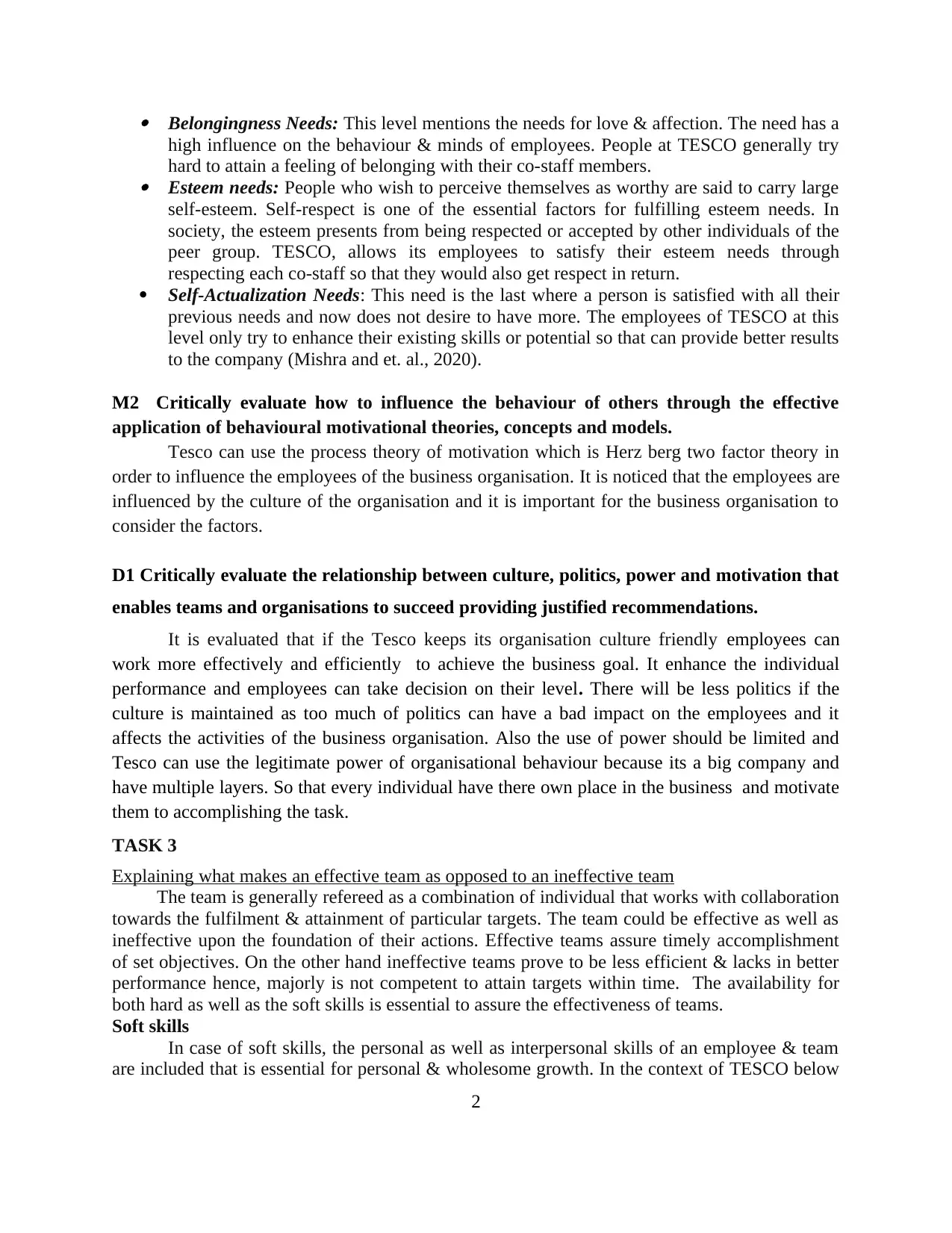
Belongingness Needs: This level mentions the needs for love & affection. The need has a
high influence on the behaviour & minds of employees. People at TESCO generally try
hard to attain a feeling of belonging with their co-staff members.
Esteem needs: People who wish to perceive themselves as worthy are said to carry large
self-esteem. Self-respect is one of the essential factors for fulfilling esteem needs. In
society, the esteem presents from being respected or accepted by other individuals of the
peer group. TESCO, allows its employees to satisfy their esteem needs through
respecting each co-staff so that they would also get respect in return.
Self-Actualization Needs: This need is the last where a person is satisfied with all their
previous needs and now does not desire to have more. The employees of TESCO at this
level only try to enhance their existing skills or potential so that can provide better results
to the company (Mishra and et. al., 2020).
M2 Critically evaluate how to influence the behaviour of others through the effective
application of behavioural motivational theories, concepts and models.
Tesco can use the process theory of motivation which is Herz berg two factor theory in
order to influence the employees of the business organisation. It is noticed that the employees are
influenced by the culture of the organisation and it is important for the business organisation to
consider the factors.
D1 Critically evaluate the relationship between culture, politics, power and motivation that
enables teams and organisations to succeed providing justified recommendations.
It is evaluated that if the Tesco keeps its organisation culture friendly employees can
work more effectively and efficiently to achieve the business goal. It enhance the individual
performance and employees can take decision on their level. There will be less politics if the
culture is maintained as too much of politics can have a bad impact on the employees and it
affects the activities of the business organisation. Also the use of power should be limited and
Tesco can use the legitimate power of organisational behaviour because its a big company and
have multiple layers. So that every individual have there own place in the business and motivate
them to accomplishing the task.
TASK 3
Explaining what makes an effective team as opposed to an ineffective team
The team is generally refereed as a combination of individual that works with collaboration
towards the fulfilment & attainment of particular targets. The team could be effective as well as
ineffective upon the foundation of their actions. Effective teams assure timely accomplishment
of set objectives. On the other hand ineffective teams prove to be less efficient & lacks in better
performance hence, majorly is not competent to attain targets within time. The availability for
both hard as well as the soft skills is essential to assure the effectiveness of teams.
Soft skills
In case of soft skills, the personal as well as interpersonal skills of an employee & team
are included that is essential for personal & wholesome growth. In the context of TESCO below
2
high influence on the behaviour & minds of employees. People at TESCO generally try
hard to attain a feeling of belonging with their co-staff members.
Esteem needs: People who wish to perceive themselves as worthy are said to carry large
self-esteem. Self-respect is one of the essential factors for fulfilling esteem needs. In
society, the esteem presents from being respected or accepted by other individuals of the
peer group. TESCO, allows its employees to satisfy their esteem needs through
respecting each co-staff so that they would also get respect in return.
Self-Actualization Needs: This need is the last where a person is satisfied with all their
previous needs and now does not desire to have more. The employees of TESCO at this
level only try to enhance their existing skills or potential so that can provide better results
to the company (Mishra and et. al., 2020).
M2 Critically evaluate how to influence the behaviour of others through the effective
application of behavioural motivational theories, concepts and models.
Tesco can use the process theory of motivation which is Herz berg two factor theory in
order to influence the employees of the business organisation. It is noticed that the employees are
influenced by the culture of the organisation and it is important for the business organisation to
consider the factors.
D1 Critically evaluate the relationship between culture, politics, power and motivation that
enables teams and organisations to succeed providing justified recommendations.
It is evaluated that if the Tesco keeps its organisation culture friendly employees can
work more effectively and efficiently to achieve the business goal. It enhance the individual
performance and employees can take decision on their level. There will be less politics if the
culture is maintained as too much of politics can have a bad impact on the employees and it
affects the activities of the business organisation. Also the use of power should be limited and
Tesco can use the legitimate power of organisational behaviour because its a big company and
have multiple layers. So that every individual have there own place in the business and motivate
them to accomplishing the task.
TASK 3
Explaining what makes an effective team as opposed to an ineffective team
The team is generally refereed as a combination of individual that works with collaboration
towards the fulfilment & attainment of particular targets. The team could be effective as well as
ineffective upon the foundation of their actions. Effective teams assure timely accomplishment
of set objectives. On the other hand ineffective teams prove to be less efficient & lacks in better
performance hence, majorly is not competent to attain targets within time. The availability for
both hard as well as the soft skills is essential to assure the effectiveness of teams.
Soft skills
In case of soft skills, the personal as well as interpersonal skills of an employee & team
are included that is essential for personal & wholesome growth. In the context of TESCO below
2
Paraphrase This Document
Need a fresh take? Get an instant paraphrase of this document with our AI Paraphraser
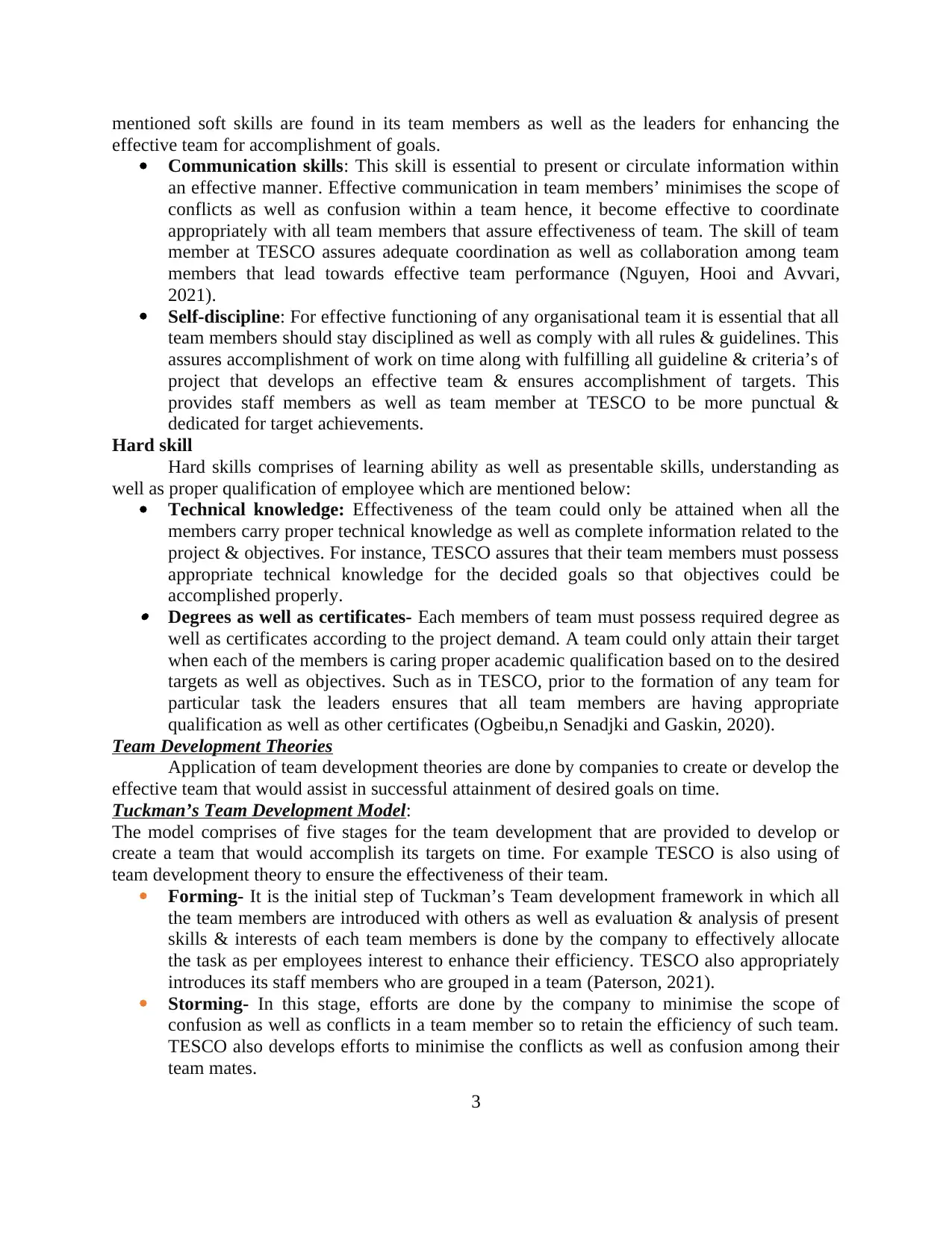
mentioned soft skills are found in its team members as well as the leaders for enhancing the
effective team for accomplishment of goals.
Communication skills: This skill is essential to present or circulate information within
an effective manner. Effective communication in team members’ minimises the scope of
conflicts as well as confusion within a team hence, it become effective to coordinate
appropriately with all team members that assure effectiveness of team. The skill of team
member at TESCO assures adequate coordination as well as collaboration among team
members that lead towards effective team performance (Nguyen, Hooi and Avvari,
2021).
Self-discipline: For effective functioning of any organisational team it is essential that all
team members should stay disciplined as well as comply with all rules & guidelines. This
assures accomplishment of work on time along with fulfilling all guideline & criteria’s of
project that develops an effective team & ensures accomplishment of targets. This
provides staff members as well as team member at TESCO to be more punctual &
dedicated for target achievements.
Hard skill
Hard skills comprises of learning ability as well as presentable skills, understanding as
well as proper qualification of employee which are mentioned below:
Technical knowledge: Effectiveness of the team could only be attained when all the
members carry proper technical knowledge as well as complete information related to the
project & objectives. For instance, TESCO assures that their team members must possess
appropriate technical knowledge for the decided goals so that objectives could be
accomplished properly.
Degrees as well as certificates- Each members of team must possess required degree as
well as certificates according to the project demand. A team could only attain their target
when each of the members is caring proper academic qualification based on to the desired
targets as well as objectives. Such as in TESCO, prior to the formation of any team for
particular task the leaders ensures that all team members are having appropriate
qualification as well as other certificates (Ogbeibu,n Senadjki and Gaskin, 2020).
Team Development Theories
Application of team development theories are done by companies to create or develop the
effective team that would assist in successful attainment of desired goals on time.
Tuckman’s Team Development Model:
The model comprises of five stages for the team development that are provided to develop or
create a team that would accomplish its targets on time. For example TESCO is also using of
team development theory to ensure the effectiveness of their team.
Forming- It is the initial step of Tuckman’s Team development framework in which all
the team members are introduced with others as well as evaluation & analysis of present
skills & interests of each team members is done by the company to effectively allocate
the task as per employees interest to enhance their efficiency. TESCO also appropriately
introduces its staff members who are grouped in a team (Paterson, 2021).
Storming- In this stage, efforts are done by the company to minimise the scope of
confusion as well as conflicts in a team member so to retain the efficiency of such team.
TESCO also develops efforts to minimise the conflicts as well as confusion among their
team mates.
3
effective team for accomplishment of goals.
Communication skills: This skill is essential to present or circulate information within
an effective manner. Effective communication in team members’ minimises the scope of
conflicts as well as confusion within a team hence, it become effective to coordinate
appropriately with all team members that assure effectiveness of team. The skill of team
member at TESCO assures adequate coordination as well as collaboration among team
members that lead towards effective team performance (Nguyen, Hooi and Avvari,
2021).
Self-discipline: For effective functioning of any organisational team it is essential that all
team members should stay disciplined as well as comply with all rules & guidelines. This
assures accomplishment of work on time along with fulfilling all guideline & criteria’s of
project that develops an effective team & ensures accomplishment of targets. This
provides staff members as well as team member at TESCO to be more punctual &
dedicated for target achievements.
Hard skill
Hard skills comprises of learning ability as well as presentable skills, understanding as
well as proper qualification of employee which are mentioned below:
Technical knowledge: Effectiveness of the team could only be attained when all the
members carry proper technical knowledge as well as complete information related to the
project & objectives. For instance, TESCO assures that their team members must possess
appropriate technical knowledge for the decided goals so that objectives could be
accomplished properly.
Degrees as well as certificates- Each members of team must possess required degree as
well as certificates according to the project demand. A team could only attain their target
when each of the members is caring proper academic qualification based on to the desired
targets as well as objectives. Such as in TESCO, prior to the formation of any team for
particular task the leaders ensures that all team members are having appropriate
qualification as well as other certificates (Ogbeibu,n Senadjki and Gaskin, 2020).
Team Development Theories
Application of team development theories are done by companies to create or develop the
effective team that would assist in successful attainment of desired goals on time.
Tuckman’s Team Development Model:
The model comprises of five stages for the team development that are provided to develop or
create a team that would accomplish its targets on time. For example TESCO is also using of
team development theory to ensure the effectiveness of their team.
Forming- It is the initial step of Tuckman’s Team development framework in which all
the team members are introduced with others as well as evaluation & analysis of present
skills & interests of each team members is done by the company to effectively allocate
the task as per employees interest to enhance their efficiency. TESCO also appropriately
introduces its staff members who are grouped in a team (Paterson, 2021).
Storming- In this stage, efforts are done by the company to minimise the scope of
confusion as well as conflicts in a team member so to retain the efficiency of such team.
TESCO also develops efforts to minimise the conflicts as well as confusion among their
team mates.
3
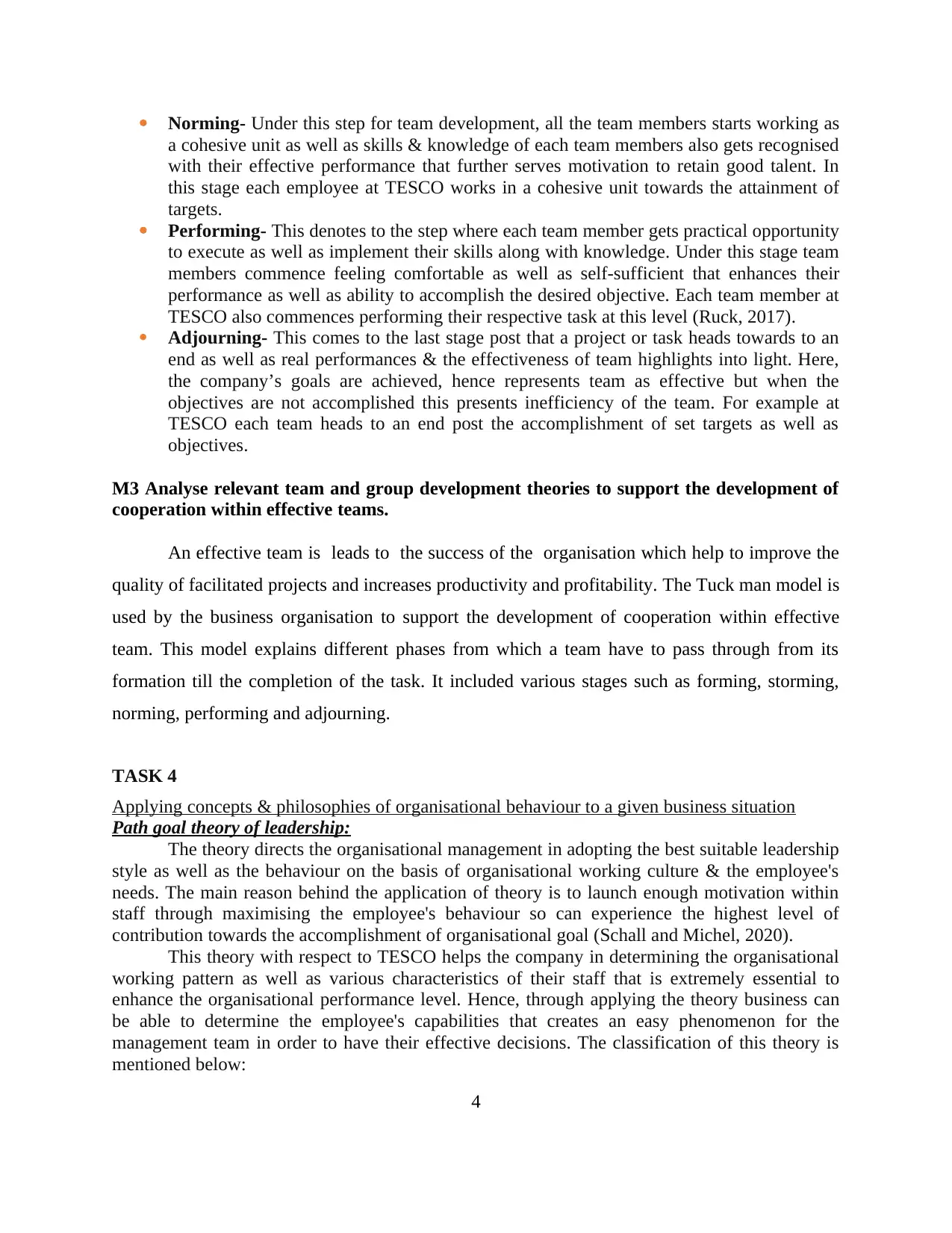
Norming- Under this step for team development, all the team members starts working as
a cohesive unit as well as skills & knowledge of each team members also gets recognised
with their effective performance that further serves motivation to retain good talent. In
this stage each employee at TESCO works in a cohesive unit towards the attainment of
targets.
Performing- This denotes to the step where each team member gets practical opportunity
to execute as well as implement their skills along with knowledge. Under this stage team
members commence feeling comfortable as well as self-sufficient that enhances their
performance as well as ability to accomplish the desired objective. Each team member at
TESCO also commences performing their respective task at this level (Ruck, 2017).
Adjourning- This comes to the last stage post that a project or task heads towards to an
end as well as real performances & the effectiveness of team highlights into light. Here,
the company’s goals are achieved, hence represents team as effective but when the
objectives are not accomplished this presents inefficiency of the team. For example at
TESCO each team heads to an end post the accomplishment of set targets as well as
objectives.
M3 Analyse relevant team and group development theories to support the development of
cooperation within effective teams.
An effective team is leads to the success of the organisation which help to improve the
quality of facilitated projects and increases productivity and profitability. The Tuck man model is
used by the business organisation to support the development of cooperation within effective
team. This model explains different phases from which a team have to pass through from its
formation till the completion of the task. It included various stages such as forming, storming,
norming, performing and adjourning.
TASK 4
Applying concepts & philosophies of organisational behaviour to a given business situation
Path goal theory of leadership:
The theory directs the organisational management in adopting the best suitable leadership
style as well as the behaviour on the basis of organisational working culture & the employee's
needs. The main reason behind the application of theory is to launch enough motivation within
staff through maximising the employee's behaviour so can experience the highest level of
contribution towards the accomplishment of organisational goal (Schall and Michel, 2020).
This theory with respect to TESCO helps the company in determining the organisational
working pattern as well as various characteristics of their staff that is extremely essential to
enhance the organisational performance level. Hence, through applying the theory business can
be able to determine the employee's capabilities that creates an easy phenomenon for the
management team in order to have their effective decisions. The classification of this theory is
mentioned below:
4
a cohesive unit as well as skills & knowledge of each team members also gets recognised
with their effective performance that further serves motivation to retain good talent. In
this stage each employee at TESCO works in a cohesive unit towards the attainment of
targets.
Performing- This denotes to the step where each team member gets practical opportunity
to execute as well as implement their skills along with knowledge. Under this stage team
members commence feeling comfortable as well as self-sufficient that enhances their
performance as well as ability to accomplish the desired objective. Each team member at
TESCO also commences performing their respective task at this level (Ruck, 2017).
Adjourning- This comes to the last stage post that a project or task heads towards to an
end as well as real performances & the effectiveness of team highlights into light. Here,
the company’s goals are achieved, hence represents team as effective but when the
objectives are not accomplished this presents inefficiency of the team. For example at
TESCO each team heads to an end post the accomplishment of set targets as well as
objectives.
M3 Analyse relevant team and group development theories to support the development of
cooperation within effective teams.
An effective team is leads to the success of the organisation which help to improve the
quality of facilitated projects and increases productivity and profitability. The Tuck man model is
used by the business organisation to support the development of cooperation within effective
team. This model explains different phases from which a team have to pass through from its
formation till the completion of the task. It included various stages such as forming, storming,
norming, performing and adjourning.
TASK 4
Applying concepts & philosophies of organisational behaviour to a given business situation
Path goal theory of leadership:
The theory directs the organisational management in adopting the best suitable leadership
style as well as the behaviour on the basis of organisational working culture & the employee's
needs. The main reason behind the application of theory is to launch enough motivation within
staff through maximising the employee's behaviour so can experience the highest level of
contribution towards the accomplishment of organisational goal (Schall and Michel, 2020).
This theory with respect to TESCO helps the company in determining the organisational
working pattern as well as various characteristics of their staff that is extremely essential to
enhance the organisational performance level. Hence, through applying the theory business can
be able to determine the employee's capabilities that creates an easy phenomenon for the
management team in order to have their effective decisions. The classification of this theory is
mentioned below:
4
⊘ This is a preview!⊘
Do you want full access?
Subscribe today to unlock all pages.

Trusted by 1+ million students worldwide
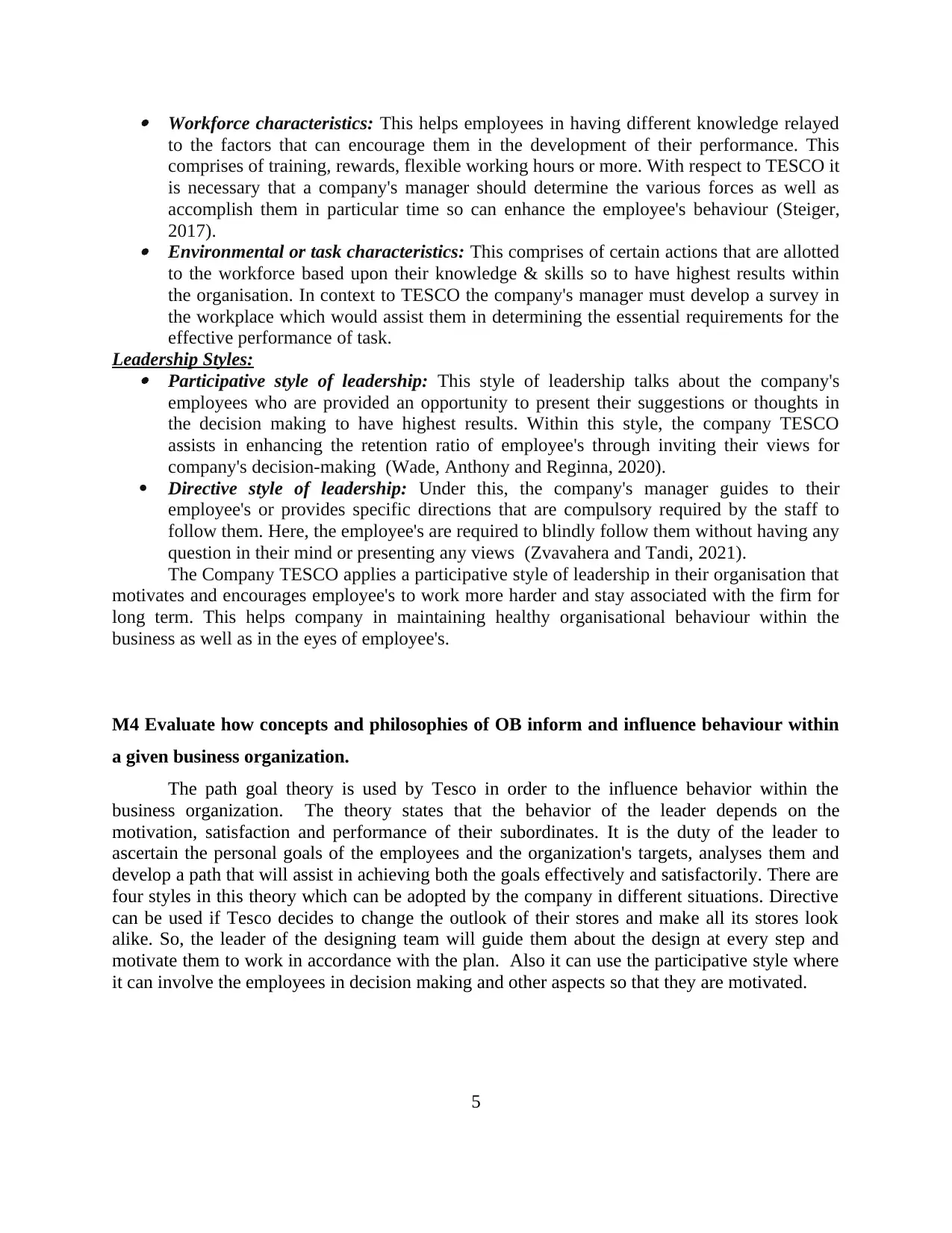
Workforce characteristics: This helps employees in having different knowledge relayed
to the factors that can encourage them in the development of their performance. This
comprises of training, rewards, flexible working hours or more. With respect to TESCO it
is necessary that a company's manager should determine the various forces as well as
accomplish them in particular time so can enhance the employee's behaviour (Steiger,
2017).
Environmental or task characteristics: This comprises of certain actions that are allotted
to the workforce based upon their knowledge & skills so to have highest results within
the organisation. In context to TESCO the company's manager must develop a survey in
the workplace which would assist them in determining the essential requirements for the
effective performance of task.
Leadership Styles:
Participative style of leadership: This style of leadership talks about the company's
employees who are provided an opportunity to present their suggestions or thoughts in
the decision making to have highest results. Within this style, the company TESCO
assists in enhancing the retention ratio of employee's through inviting their views for
company's decision-making (Wade, Anthony and Reginna, 2020).
Directive style of leadership: Under this, the company's manager guides to their
employee's or provides specific directions that are compulsory required by the staff to
follow them. Here, the employee's are required to blindly follow them without having any
question in their mind or presenting any views (Zvavahera and Tandi, 2021).
The Company TESCO applies a participative style of leadership in their organisation that
motivates and encourages employee's to work more harder and stay associated with the firm for
long term. This helps company in maintaining healthy organisational behaviour within the
business as well as in the eyes of employee's.
M4 Evaluate how concepts and philosophies of OB inform and influence behaviour within
a given business organization.
The path goal theory is used by Tesco in order to the influence behavior within the
business organization. The theory states that the behavior of the leader depends on the
motivation, satisfaction and performance of their subordinates. It is the duty of the leader to
ascertain the personal goals of the employees and the organization's targets, analyses them and
develop a path that will assist in achieving both the goals effectively and satisfactorily. There are
four styles in this theory which can be adopted by the company in different situations. Directive
can be used if Tesco decides to change the outlook of their stores and make all its stores look
alike. So, the leader of the designing team will guide them about the design at every step and
motivate them to work in accordance with the plan. Also it can use the participative style where
it can involve the employees in decision making and other aspects so that they are motivated.
5
to the factors that can encourage them in the development of their performance. This
comprises of training, rewards, flexible working hours or more. With respect to TESCO it
is necessary that a company's manager should determine the various forces as well as
accomplish them in particular time so can enhance the employee's behaviour (Steiger,
2017).
Environmental or task characteristics: This comprises of certain actions that are allotted
to the workforce based upon their knowledge & skills so to have highest results within
the organisation. In context to TESCO the company's manager must develop a survey in
the workplace which would assist them in determining the essential requirements for the
effective performance of task.
Leadership Styles:
Participative style of leadership: This style of leadership talks about the company's
employees who are provided an opportunity to present their suggestions or thoughts in
the decision making to have highest results. Within this style, the company TESCO
assists in enhancing the retention ratio of employee's through inviting their views for
company's decision-making (Wade, Anthony and Reginna, 2020).
Directive style of leadership: Under this, the company's manager guides to their
employee's or provides specific directions that are compulsory required by the staff to
follow them. Here, the employee's are required to blindly follow them without having any
question in their mind or presenting any views (Zvavahera and Tandi, 2021).
The Company TESCO applies a participative style of leadership in their organisation that
motivates and encourages employee's to work more harder and stay associated with the firm for
long term. This helps company in maintaining healthy organisational behaviour within the
business as well as in the eyes of employee's.
M4 Evaluate how concepts and philosophies of OB inform and influence behaviour within
a given business organization.
The path goal theory is used by Tesco in order to the influence behavior within the
business organization. The theory states that the behavior of the leader depends on the
motivation, satisfaction and performance of their subordinates. It is the duty of the leader to
ascertain the personal goals of the employees and the organization's targets, analyses them and
develop a path that will assist in achieving both the goals effectively and satisfactorily. There are
four styles in this theory which can be adopted by the company in different situations. Directive
can be used if Tesco decides to change the outlook of their stores and make all its stores look
alike. So, the leader of the designing team will guide them about the design at every step and
motivate them to work in accordance with the plan. Also it can use the participative style where
it can involve the employees in decision making and other aspects so that they are motivated.
5
Paraphrase This Document
Need a fresh take? Get an instant paraphrase of this document with our AI Paraphraser
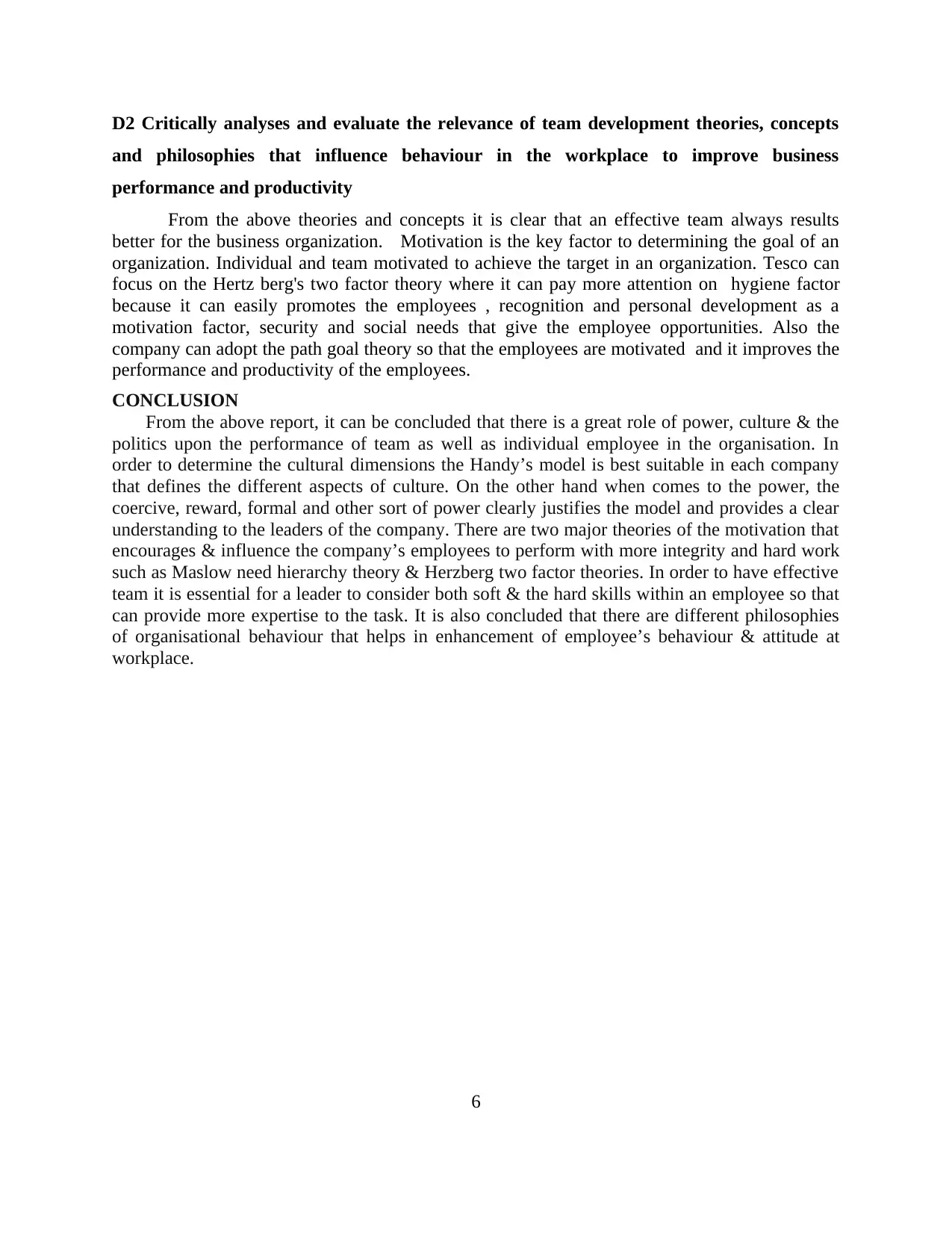
D2 Critically analyses and evaluate the relevance of team development theories, concepts
and philosophies that influence behaviour in the workplace to improve business
performance and productivity
From the above theories and concepts it is clear that an effective team always results
better for the business organization. Motivation is the key factor to determining the goal of an
organization. Individual and team motivated to achieve the target in an organization. Tesco can
focus on the Hertz berg's two factor theory where it can pay more attention on hygiene factor
because it can easily promotes the employees , recognition and personal development as a
motivation factor, security and social needs that give the employee opportunities. Also the
company can adopt the path goal theory so that the employees are motivated and it improves the
performance and productivity of the employees.
CONCLUSION
From the above report, it can be concluded that there is a great role of power, culture & the
politics upon the performance of team as well as individual employee in the organisation. In
order to determine the cultural dimensions the Handy’s model is best suitable in each company
that defines the different aspects of culture. On the other hand when comes to the power, the
coercive, reward, formal and other sort of power clearly justifies the model and provides a clear
understanding to the leaders of the company. There are two major theories of the motivation that
encourages & influence the company’s employees to perform with more integrity and hard work
such as Maslow need hierarchy theory & Herzberg two factor theories. In order to have effective
team it is essential for a leader to consider both soft & the hard skills within an employee so that
can provide more expertise to the task. It is also concluded that there are different philosophies
of organisational behaviour that helps in enhancement of employee’s behaviour & attitude at
workplace.
6
and philosophies that influence behaviour in the workplace to improve business
performance and productivity
From the above theories and concepts it is clear that an effective team always results
better for the business organization. Motivation is the key factor to determining the goal of an
organization. Individual and team motivated to achieve the target in an organization. Tesco can
focus on the Hertz berg's two factor theory where it can pay more attention on hygiene factor
because it can easily promotes the employees , recognition and personal development as a
motivation factor, security and social needs that give the employee opportunities. Also the
company can adopt the path goal theory so that the employees are motivated and it improves the
performance and productivity of the employees.
CONCLUSION
From the above report, it can be concluded that there is a great role of power, culture & the
politics upon the performance of team as well as individual employee in the organisation. In
order to determine the cultural dimensions the Handy’s model is best suitable in each company
that defines the different aspects of culture. On the other hand when comes to the power, the
coercive, reward, formal and other sort of power clearly justifies the model and provides a clear
understanding to the leaders of the company. There are two major theories of the motivation that
encourages & influence the company’s employees to perform with more integrity and hard work
such as Maslow need hierarchy theory & Herzberg two factor theories. In order to have effective
team it is essential for a leader to consider both soft & the hard skills within an employee so that
can provide more expertise to the task. It is also concluded that there are different philosophies
of organisational behaviour that helps in enhancement of employee’s behaviour & attitude at
workplace.
6
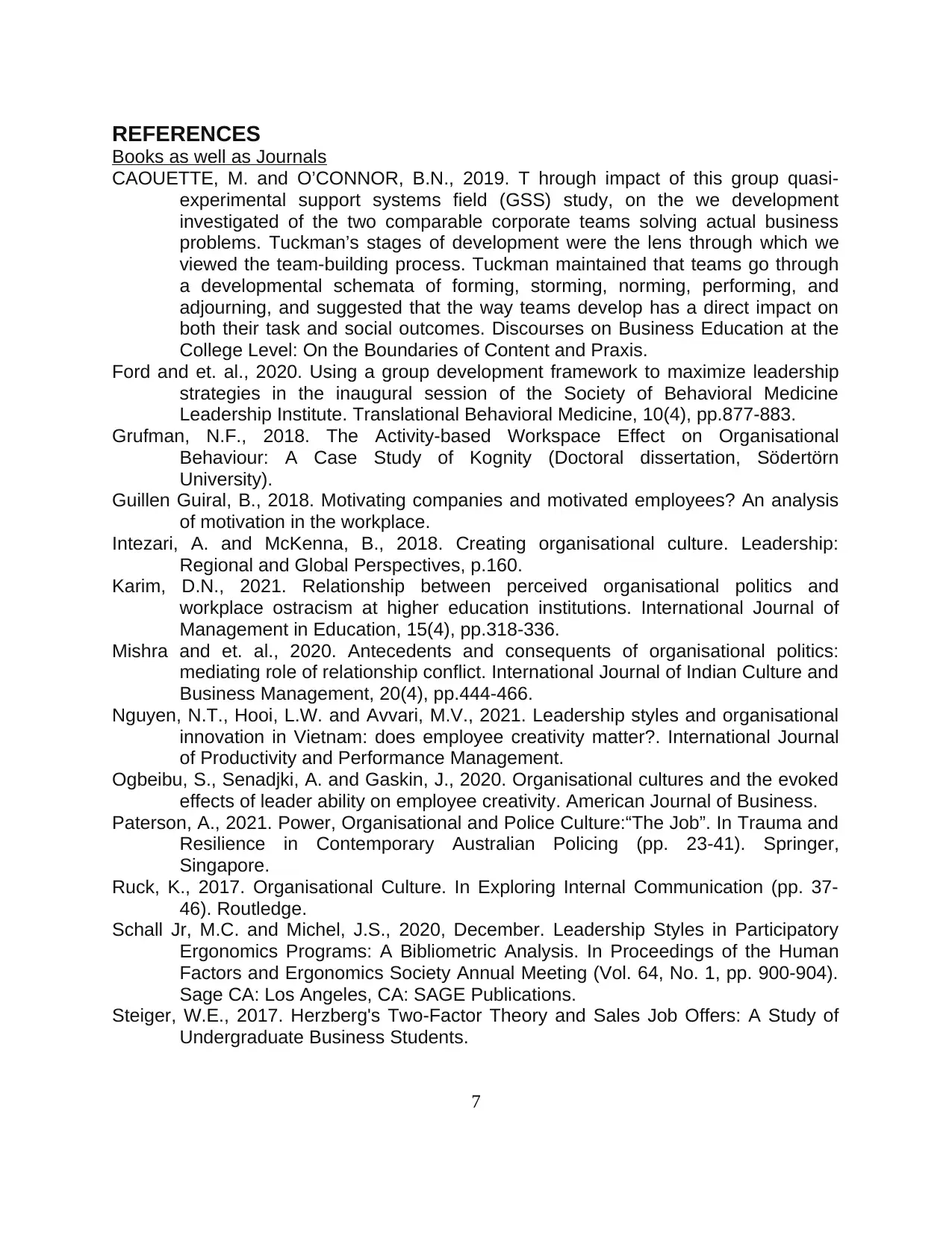
REFERENCES
Books as well as Journals
CAOUETTE, M. and O’CONNOR, B.N., 2019. T hrough impact of this group quasi-
experimental support systems field (GSS) study, on the we development
investigated of the two comparable corporate teams solving actual business
problems. Tuckman’s stages of development were the lens through which we
viewed the team-building process. Tuckman maintained that teams go through
a developmental schemata of forming, storming, norming, performing, and
adjourning, and suggested that the way teams develop has a direct impact on
both their task and social outcomes. Discourses on Business Education at the
College Level: On the Boundaries of Content and Praxis.
Ford and et. al., 2020. Using a group development framework to maximize leadership
strategies in the inaugural session of the Society of Behavioral Medicine
Leadership Institute. Translational Behavioral Medicine, 10(4), pp.877-883.
Grufman, N.F., 2018. The Activity-based Workspace Effect on Organisational
Behaviour: A Case Study of Kognity (Doctoral dissertation, Södertörn
University).
Guillen Guiral, B., 2018. Motivating companies and motivated employees? An analysis
of motivation in the workplace.
Intezari, A. and McKenna, B., 2018. Creating organisational culture. Leadership:
Regional and Global Perspectives, p.160.
Karim, D.N., 2021. Relationship between perceived organisational politics and
workplace ostracism at higher education institutions. International Journal of
Management in Education, 15(4), pp.318-336.
Mishra and et. al., 2020. Antecedents and consequents of organisational politics:
mediating role of relationship conflict. International Journal of Indian Culture and
Business Management, 20(4), pp.444-466.
Nguyen, N.T., Hooi, L.W. and Avvari, M.V., 2021. Leadership styles and organisational
innovation in Vietnam: does employee creativity matter?. International Journal
of Productivity and Performance Management.
Ogbeibu, S., Senadjki, A. and Gaskin, J., 2020. Organisational cultures and the evoked
effects of leader ability on employee creativity. American Journal of Business.
Paterson, A., 2021. Power, Organisational and Police Culture:“The Job”. In Trauma and
Resilience in Contemporary Australian Policing (pp. 23-41). Springer,
Singapore.
Ruck, K., 2017. Organisational Culture. In Exploring Internal Communication (pp. 37-
46). Routledge.
Schall Jr, M.C. and Michel, J.S., 2020, December. Leadership Styles in Participatory
Ergonomics Programs: A Bibliometric Analysis. In Proceedings of the Human
Factors and Ergonomics Society Annual Meeting (Vol. 64, No. 1, pp. 900-904).
Sage CA: Los Angeles, CA: SAGE Publications.
Steiger, W.E., 2017. Herzberg's Two-Factor Theory and Sales Job Offers: A Study of
Undergraduate Business Students.
7
Books as well as Journals
CAOUETTE, M. and O’CONNOR, B.N., 2019. T hrough impact of this group quasi-
experimental support systems field (GSS) study, on the we development
investigated of the two comparable corporate teams solving actual business
problems. Tuckman’s stages of development were the lens through which we
viewed the team-building process. Tuckman maintained that teams go through
a developmental schemata of forming, storming, norming, performing, and
adjourning, and suggested that the way teams develop has a direct impact on
both their task and social outcomes. Discourses on Business Education at the
College Level: On the Boundaries of Content and Praxis.
Ford and et. al., 2020. Using a group development framework to maximize leadership
strategies in the inaugural session of the Society of Behavioral Medicine
Leadership Institute. Translational Behavioral Medicine, 10(4), pp.877-883.
Grufman, N.F., 2018. The Activity-based Workspace Effect on Organisational
Behaviour: A Case Study of Kognity (Doctoral dissertation, Södertörn
University).
Guillen Guiral, B., 2018. Motivating companies and motivated employees? An analysis
of motivation in the workplace.
Intezari, A. and McKenna, B., 2018. Creating organisational culture. Leadership:
Regional and Global Perspectives, p.160.
Karim, D.N., 2021. Relationship between perceived organisational politics and
workplace ostracism at higher education institutions. International Journal of
Management in Education, 15(4), pp.318-336.
Mishra and et. al., 2020. Antecedents and consequents of organisational politics:
mediating role of relationship conflict. International Journal of Indian Culture and
Business Management, 20(4), pp.444-466.
Nguyen, N.T., Hooi, L.W. and Avvari, M.V., 2021. Leadership styles and organisational
innovation in Vietnam: does employee creativity matter?. International Journal
of Productivity and Performance Management.
Ogbeibu, S., Senadjki, A. and Gaskin, J., 2020. Organisational cultures and the evoked
effects of leader ability on employee creativity. American Journal of Business.
Paterson, A., 2021. Power, Organisational and Police Culture:“The Job”. In Trauma and
Resilience in Contemporary Australian Policing (pp. 23-41). Springer,
Singapore.
Ruck, K., 2017. Organisational Culture. In Exploring Internal Communication (pp. 37-
46). Routledge.
Schall Jr, M.C. and Michel, J.S., 2020, December. Leadership Styles in Participatory
Ergonomics Programs: A Bibliometric Analysis. In Proceedings of the Human
Factors and Ergonomics Society Annual Meeting (Vol. 64, No. 1, pp. 900-904).
Sage CA: Los Angeles, CA: SAGE Publications.
Steiger, W.E., 2017. Herzberg's Two-Factor Theory and Sales Job Offers: A Study of
Undergraduate Business Students.
7
⊘ This is a preview!⊘
Do you want full access?
Subscribe today to unlock all pages.

Trusted by 1+ million students worldwide
1 out of 13
Related Documents
Your All-in-One AI-Powered Toolkit for Academic Success.
+13062052269
info@desklib.com
Available 24*7 on WhatsApp / Email
![[object Object]](/_next/static/media/star-bottom.7253800d.svg)
Unlock your academic potential
Copyright © 2020–2026 A2Z Services. All Rights Reserved. Developed and managed by ZUCOL.




